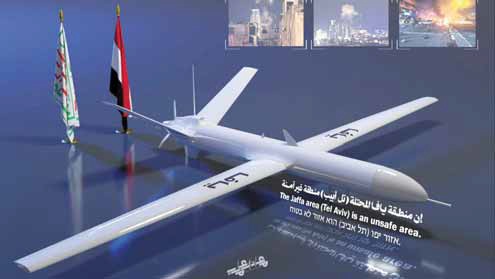Several American media outlets highlighted the Arab region and the repercussions of the Israeli aggression on Yemen and the assassinations carried out in Tehran and Beirut. The American magazine "The Atlantic" reported that the Israeli aggression on Yemen has placed "Ansar Allah" in direct confrontation with the Israeli enemy, which they had long desired. The magazine noted that the Yemenis hold a significant enmity towards Israel and have awaited the opportunity to engage in direct conflict. The attack on "Tel Aviv" by a drone named "Yafa," launched by Sana'a forces, represented a tangible realization of "Ansar Allah's" anti-Israel project.
Similarly, the magazine "Foreign Affairs" published a report highlighting the failure of the U.S. military coalition aimed at protecting Israeli interests in the face of escalating Yemeni military operations. The magazine explained that this military coalition has not achieved any of its goals, while Yemeni military operations against the Israeli enemy and hostile naval vessels continue to escalate both in quantity and quality. The magazine pointed out that fighting against the United States and Israel is a fundamental part of the Yemeni "Ansar Allah" project.
Strangling "Israel" with a Ring of Fire
Regarding the escalation of military operations by the armed forces and the announcement by Sayyid Abdul-Malik al-Houthi of entering the fifth phase, Zionist analysts have dedicated significant attention to the nature of the targets that could be hit and the scenarios the Israeli occupation can be subjected to. The Hebrew newspaper "Makor Rishon" attempted to predict possible developments, explaining that the Yemeni army aims to strangle "Israel" with a wide ring of fire by escalating the naval blockade to the Mediterranean Sea and coordinating with "the Axis of Resistance" forces to attack "Israel." The newspaper suggested that the fifth phase of escalation would focus on these two paths.
The newspaper expressed concern about the announcement of entering the fifth phase, especially since it began with targeting "Tel Aviv." If this is the beginning of the fifth phase, what will the sixth and seventh phases look like? The newspaper indicated that Yemen has two options: the first is to enhance coordination and cooperation between Sana'a and the Axis of Resistance to further synergize capabilities to implement the so-called ring of fire around "Israel." The second option is to expand the naval blockade from the Red Sea area, linking it to the Mediterranean Sea, and covering the entire region with fire and missiles. The newspaper added that by linking these two directions, the "Houthis" aim to strangle "Israel" with a ring of fire and drown it, considering this a "daunting task" but noting that "the Houthis are not alone."
An Intractable Problem
For Americans to admit that the Yemeni army has become an intractable problem is an indication that Washington, with its advanced military capabilities, has become helpless in the face of Yemen, both now and in the future. To confirm this, the "Foreign Affairs" magazine, affiliated with the American Council on Foreign Relations, mentioned that the "Houthis" have proven to be an intractable problem for the United States and its allies. The best efforts of the American coalition to rein in the "Houthis" have failed to deter them, and the bombing against them has only highlighted their cohesion. It appears they are unwilling to retreat, adding that bombing the "Houthis" will not succeed as they can endure significant punishment and continue to launch attacks against ships in the Red Sea and against "Israel."
The "Foreign Affairs" magazine stated, "The escalation of operations by the Houthis has shown them as heroes in the region and courageous opponents of the West. The United States has not been able to stop their attacks or curb their propaganda campaign," confirming that attacks in the Red Sea have had significant and increasing repercussions on Israeli-linked ships in the Red Sea.
Yemen's Drones Drain Pentagon's Coffers
Regarding the impact of Yemeni military operations on the American war effort, enemy statements confirm that Washington, described as the world's strongest economy, has reached a dead end and faces problems with the costs of countering Yemeni attacks. In this regard, the American magazine "New Lines" stated that the low-cost drones used by Sana'a forces in the Red Sea drain the high-cost capabilities of the American army. The magazine noted that while the Pentagon searches for cheaper solutions, there is a risk of new Yemeni weapons and tactics emerging. Even if the United States manages to find solutions, implementing them to benefit will take a long time.







